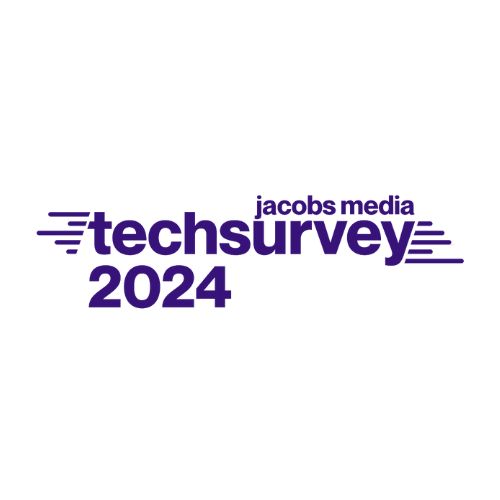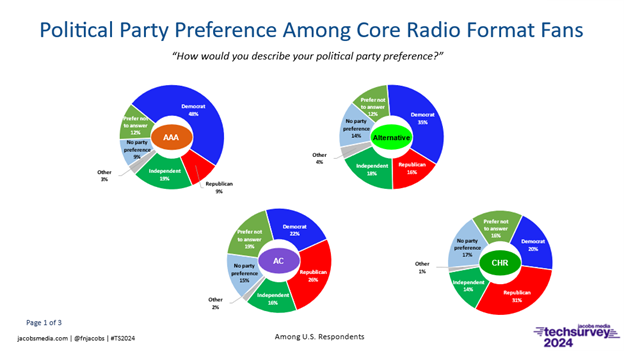
After giving a first glimpse at this year’s Techsurvey results at CRS 2024, Jacobs Media is releasing new data that could significantly influence how political campaigns leverage radio ads as, perhaps unsurprisingly, radio listeners show a strong interest in the 2024 elections.
With responses from over 29,000 US radio listeners, the annual survey provides a detailed look into the preferences and behaviors of radio’s core audience. More than 80% of respondents, particularly older demographics and males, intend to follow the election closely. The top three formats most likely to closely follow the election are News/Talk, AAA, and Sports.
Interestingly, the three formats least likely to follow the election are Alternative and Rock, with Country finishing dead last.
As for radio’s party split, the survey shows a 2-point shift towards the Democratic Party and a corresponding decline in Republican affiliation as compared to 2020 results. Additionally, the proportion of Independents has increased by 2%, with nearly 30% of respondents not aligning with any party.
Techsurvey 2024 outlines clear generational and ethnic divides in political affiliation. Younger listeners – Gen Z and Millennials – tend to identify as Democrats, whereas older groups – Gen X, Boomers, and the Greatest Generation – lean towards the GOP. Ethnic minorities, particularly Black listeners, show a strong preference for the Democratic Party, while white listeners are more likely to support the GOP.
The survey categorizes listeners by their preferred radio formats, offering a unique lens to view political leanings. For instance, Country radio fans are predominantly Republican, Urban AC listeners largely support Democrats, and Sports Radio has the highest concentration of Independents.

Respondents’ living situations also correlate with political affiliations. Urban residents predominantly lean Democratic, rural listeners are majorly Republican, and suburbanites present a more mixed picture with a slight GOP preference. Interestingly, Independents are distributed equally across urban, suburban, and rural areas.
This spatial analysis of political preference underscores future uses for FM geo-targeting in political radio advertising.
Jacobs Media COO Paul Jacobs said, “Without question, political advertising dollars are important to radio operators, but historically, the only data stations have had is ratings. The data from Techsurvey 2024 takes radio’s sales pitch to a higher level, providing invaluable insight designed to not only help radio sellers, but also leaders of political campaigns determine where to invest their dollars for maximum effect. It makes a powerful statement not only about radio’s power, but also demonstrates the versatility of the medium – radio can help political campaigns regardless of party, region, or size.”
President Fred Jacobs added, “As the Nielsen study notes, radio is an excellent marketing vehicle in political races. Techsurvey reveals actionable results by format, generations, ethnicity, and other key demographics.”
Jacobs Media’s upcoming webinar in April promises to unveil more insights, further enriching the strategies for political advertising on radio.





